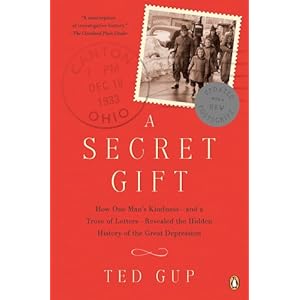Are you looking for a feel good book for the holiday season? I've found one that promotes compassion, community, and the value of archives.
 "A Secret Gift: How One Man's Kindness - and a Trove of Letters - Revealed the Hidden History of the Great Depression" tells the story of how one man's generosity helped lift the entire city of Canton, Ohio. Author and investigative reporter, Ted Gup, uses a family collection of papers as a thread through his story. In 2008, Gup's mother handed him a suitcase of family papers for him to explore. Within the collection was a newsclipping from 1933. It contained and ad that offered money from an anonymous donor to families in need so they could have a happy Christmas. Along with the clipping was an envelope stuffed with letters requesting assistance and also letters of thanks from those who received it. Gup's story unfolds as he discovers that the donor was his generous grandfather. He sets out to learn more about a larger than life man full of mysteries and along the way uncovers a tale of civic pride and personal survival.
"A Secret Gift: How One Man's Kindness - and a Trove of Letters - Revealed the Hidden History of the Great Depression" tells the story of how one man's generosity helped lift the entire city of Canton, Ohio. Author and investigative reporter, Ted Gup, uses a family collection of papers as a thread through his story. In 2008, Gup's mother handed him a suitcase of family papers for him to explore. Within the collection was a newsclipping from 1933. It contained and ad that offered money from an anonymous donor to families in need so they could have a happy Christmas. Along with the clipping was an envelope stuffed with letters requesting assistance and also letters of thanks from those who received it. Gup's story unfolds as he discovers that the donor was his generous grandfather. He sets out to learn more about a larger than life man full of mysteries and along the way uncovers a tale of civic pride and personal survival."Then, one night at three in the morning...I sat up in bed and recognized the letters for what they were - not a dusty archive but a time capsule addressed to the present, one that had taken on a sense of urgency."
"A Secret Gift" links the voices from the Depression to those struggling today. It discusses parallels between generations while advocating for humanity's resilience. It shows how history helps us understand ourselves and society; how a knowledge of history can steer us toward making things better. From the work I feel a call to contemporary society to examine its past, to explore the goodness of mankind -- to see the parallels between our last "Hard Times" and today -- to find guidance through our current economic troubles.
"The letters helped me understand what our neighbors had endured and how the legacy of their suffering shaped the character of my community and my family..."
Gup does a remarkable job of uncovering the back story of families represented in the letters and locating descendants of correspondents. Through extensive research that he discusses in his publication, he reveals what happened to each family, and how the secret gift helped or sometimes changed them. While weaving his own family story among the lives of others, he recognizes their similar struggles and dreams regardless of religion and social "class." Early on he states, "community is more than collective self-interest." That, to me, is the moral of his story.
As an archivist, I see the suitcase of letters as the type of collection about which my profession dreams. Filled with first hand accounts that reveal a more personal history than most papers, the collection can take a researcher in many directions. In this case, it took one thoughtful grandson on a remarkable journey that will enlighten the reader and certainly fill one's heart with seasonal warmth.
No comments:
Post a Comment